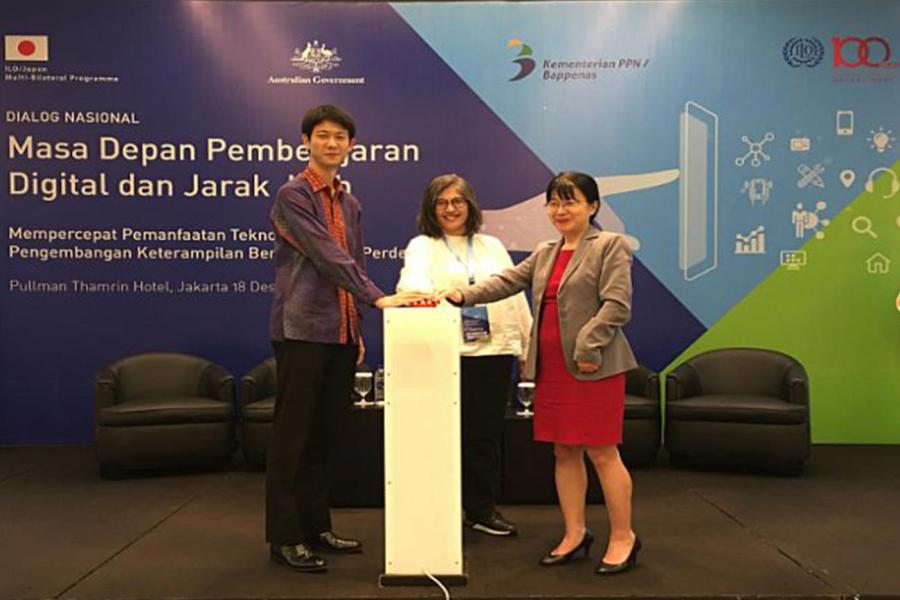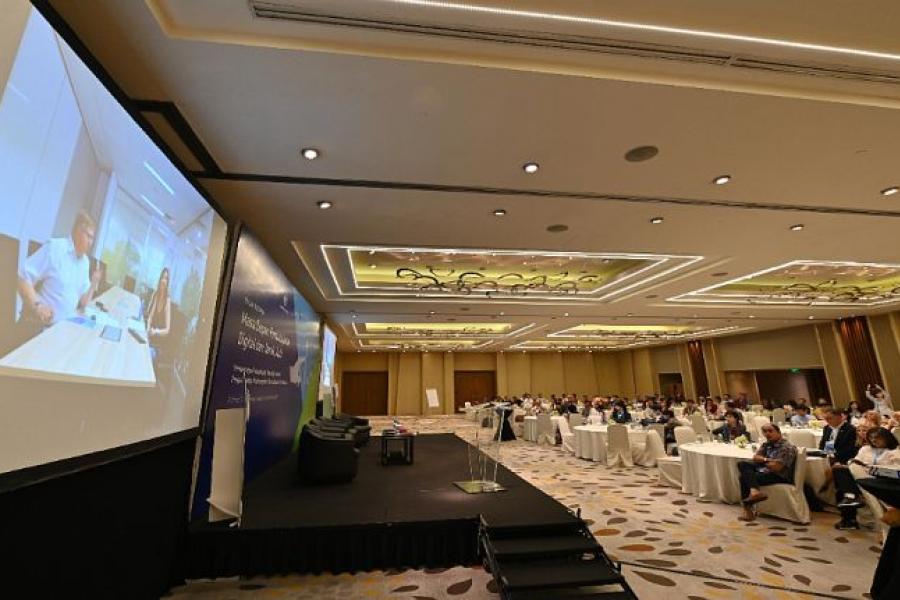Closing the gap in skills development through the acceleration of digital and e-learning programmes
18 December 2019
- The advancement of digitalization and technology has eliminated time and space boundaries, providing an opportunity for people living in rural areas to have a greater access to good quality training at an affordable cost through distance and e-learning.
The advancement of digitalization and technology has eliminated time and space boundaries, providing an opportunity for people living in rural areas to have a greater access to good quality training at an affordable cost through distance and e-learning. With Indonesia’s internet penetration reaching 64.7 percent of its total population, according to the 2018 data from the Indonesian Internet Service Providers (APJII), Indonesia has a good potential to harness the power of digital technologies to accelerate its human resource development.

“While TVET in Indonesia has been improving and helping youth to gain skills and find jobs; regional disparities still exist due to the geographical condition of Indonesia. We can learn from other countries how to integrate digital and e-learning in our TVET systems and address inequalities in the access to skills development between urban and rural areas." Mahatmi Parwitasari Saronto, Director of Employment and Job Opportunity Expansion of Bappenas
To further discuss and examine the use of digital technology to deliver quality skills development, particularly in rural areas, the Ministry of National Development Planning (Bappenas) in collaboration with the International Labour Organization (ILO) is conducting a one-day national policy dialogue, titled “The Future of Indonesia’s Digital and E-Learning” in Jakarta today (18/12). The event is conducted with support from the Governments of Japan and Australia.
The national policy dialogue provides a venue for key policy makers and stakeholders to discuss and share good practices, lessons learnt, experiences and challenges on the implementation of digital and e-learning programmes in the country, particularly youth in rural areas including girls, women and people with disabilities. The dialogue also further examines ways forward in integrating these technology enhancements into teaching and learning systems of the technical and vocational educations and trainings (TVETs) in the country.
Mahatmi Parwitasari Saronto, Director of Employment and Job Opportunity Expansion of Bappenas, emphasized the importance of access to quality education and training, particularly in rural and remote areas, to create competent and skilled generation of Indonesia. The Government of Indonesia is now developing the National TVET Strategies that is part of the policy discussion of today’s national dialogue.

“While TVET in Indonesia has been improving and helping youth to gain skills and find jobs; regional disparities still exist due to the geographical condition of Indonesia. We can learn from other countries how to integrate digital and e-learning in our TVET systems and address inequalities in the access to skills development between urban and rural areas,” Mahatmi remarked.
“In the era of deepening digitalization, it is important to utilize technologies in education and training programmes to ensure equal access to quality learning opportunities for all people of Indonesia. The Government of Japan is very pleased to be a partner and support ongoing reforms of the Indonesian TVET systems,” said Tadayuki Miyashita, Minister for Economic Affairs of the Embassy of Japan in Indonesia.
In this national policy dialogue, good practices in digital and e-learning education is explored by representatives from Rumah Belajar under the Ministry of National Education and Culture, the Open University of Indonesia, Ruang Guru, an online learning platform provider and Labtech, an e-vocational training provider.
Good practices on the application of digital and e-learning programmes from neighbouring countries present experts and practitioners from Australia and the Philippines: Charles Darwin University of Australia and The National Centre for Vocational Education Research of Australia (NCVER), and the National Institute for Technical Education and Skills Development of the Philippines (TESDA).
“The ILO continue to support initiatives taken by the Government of Indonesia and social partners on human development and on the reformation of TVET-system. We believe that skills development is essential to create competent and skilful generation of Indonesia who can stay competitive and productive in the fast changing world of work." Michiko Miyamoto, Country Director of the ILO in Indonesia
The interactive discussion concludes with a policy dialogue on the future of quality skills development in the country, particularly in rural areas, through the effective use of technology. The dialogue presents key representatives from the Ministry of Manpower; the Ministry of Village, Development of Disadvantaged Regions and Transmigration; the Ministry of Education and Culture; Indonesia Chamber of Commerce and Industry; and a National Confederation of Trade Unions.
“Human-centred agenda is the ILO’s main focus for future of work, placing the investment in people’s capabilities as one of the three important pillars of action. The ILO continue to support initiatives taken by the Government of Indonesia and social partners on human development and on the reformation of TVET-system. We believe that skills development is essential to create competent and skilful generation of Indonesia who can stay competitive and productive in the fast changing world of work,” stated Michiko Miyamoto, Country Director of the ILO in Indonesia.


